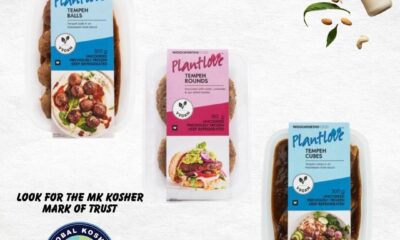
Community

Change on the plate one year after “Koshergate”
In a major step for kashrut in South Africa, a Pick n Pay product with a Montreal Kosher (MK Kosher) hechsher was added to the retailer’s shelves this week, hot on the heels of the certifier announcing its expansion in South Africa last week. Is this a sign of the times, pointing to a rapidly evolving kosher landscape on the southern tip of Africa?
On a call from Montreal, MK Kosher’s Kalman Emanuel explained that the Pick n Pay items – rice cakes and corn cakes – were produced in an MK-certified facility. “With the rising demand for MK Kosher certification in South Africa, we expect that consumers will absolutely start seeing more MK labels on the shelves of major retailers,” he says.
In October 2020, a furore over the costs of kosher certification with the United Orthodox Synagogues (UOS) Beth Din exploded in the South African Jewish community. It included complaints about high prices, inconsistencies across the market, and convoluted processes that apparently left companies stressed and struggling. Since then, a number of businesses have moved to the MK Kosher hechsher.
But the chairperson of the UOS board, Kenny Rabson, says a lot has also been happening behind the scenes at the UOS. “After the Stan & Pete incident in 2018, we brought out the OU [Orthodox Union] and CRC [Chicago Rabbinical Council] to assess everything kosher in South Africa: our restaurants, bakeries, schita [slaughter], etc. They were extremely complementary, and as a result, selected us to partner on Kosher Arabia.
“Even more exciting, the OU is allowing us to offer clients their hechsher with ours. This is on the basis of us doing the inspections – they are relying on our level of excellence. This is a fantastic achievement for South African kashrut. Essentially, they are allowing us to print their hechsher without them doing any inspections themselves. This is how much they trust our work. We believe the OU partnership will be more valuable for export than any other hechsher, as they are the biggest hechsher in the world.”
In addition, Rabson says that Beth Din kosher department Managing Director Rabbi Dovi Goldstein was at Kosherfest in the United States last week, resulting in two other hechshers looking to collaborate with the UOS. Time will tell if these come to fruition.
He explains that internally, the UOS has formalised governance in a variety of ways, including setting up remuneration and audit committees that meet regularly. It has also appointed a new director for the Beth Din office, Rabbi Shmuel Slasky, who will soon be formally introduced. He will assist dayanim with procedures, services, communication, and administration.
And, the UOS is looking to appoint a head of human resources, to “really focus on staff”. A new UOS website is to be launched in the first quarter of 2022, which will make the application process easier.
After last year’s events, Rabson says the UOS appointed an independent ombudsman, including an actuary and a lawyer, to review concerns about pricing. In the end, only one company came forward. “While it was found that they had no grounds for complaint, we were advised to lower their pricing in light of the current economy, and we did,” Rabson says.
He emphasises that the UOS has an “open-door policy”, and concerns can be brought to the organisation or even to him personally. “Especially in the current economy, we will always try to make a plan. People shouldn’t consider change without talking through the pros and cons. We wouldn’t want people to give up our hechsher, which is unanimously accepted by the whole country, for the wrong reasons. We will apply our minds to all queries that are raised.
“Other hechshers in South Africa isn’t a bad thing. We believe competition is good,” he says. “One huge misconception is that it will bring down prices for consumers. We may see this with smaller businesses, but not with larger companies.”
Moshe Amoils, the managing director of the Chocolate Tree and Nu Tree health food company, was one of the first in South Africa to approach MK Kosher for certification. “With the official announcement [last week] of Rabbi Yossi Baumgarten now working with MK, it has given MK further legitimacy in South Africa,” he says. “Working with the calibre of Rabbi Baumgarten has been of the biggest benefit. His 40+ years of knowledge in kashrut within the manufacturing arena is one of the biggest advantages. He goes over and beyond his regular facility inspections.”
He says since he moved to MK, his relationship with the UOS has remained positive. “There have been situations where they have assisted with a few issue locally, especially after the sudden passing of Rabbi [Desmond] Maizels. I’m glad to see that they have improved in certain areas. Hopefully it will be beneficial for manufactures, facilities, and consumers alike.”
Amoils is in the process of working with two international customers in the United States, “and they have both expressed satisfaction that I have an international kosher certification. MK went above and beyond in helping me with one customer. I will be working with [MK Kosher executive director] Rabbi [Saul] Emanuel this coming year on further export opportunities in Canada.”
Amoils says “there has been an overwhelming response from the community” in support of his move to MK Kosher, “to the point that community members have come up to me to say that they now exclusively support my brand because of this”.
“There were those at the beginning who didn’t know of MK. However, with marketing support from MK, which it provides at no extra cost, the community was quickly educated. Pesach was our first big experience with MK, and it went extremely smoothly.”
Another business owner who has switched to MK is Jessica Berman, whose anonymous call on ChaiFM made a big impact in October 2020. Her company, Dynastea, makes coffee enhancers, cocktail mixes, syrups, dessert purees, iced-tea concentrates, and milkshakes that are sugar free and vegan.
“MK uses a digital kosher online system, which is the most unbelievable process you’ve ever seen,” she says. “Our sweeteners are used across multiple products. For a lot of the Beth Dins, when you’re going to add in a new product or flavour, you’ve got to re-submit the same sweetener ingredients thirty times for thirty different products. With this online system, you submit an ingredient once. There’s no export fee, and they don’t charge you per flavour.”
She says the community has welcomed her new hechsher. “People are happy to see diversity. We slightly dropped our pricing once we changed [to MK].”
Emanuel says the certifier is in discussion with about six or seven companies in South Africa, and “there seems to be tremendous interest”. He emphasises that it isn’t aiming to be in competition with the local Beth Din, and isn’t working with establishments like butcheries, bakeries, or restaurants. “But like any company throughout the world, South African companies can approach us, and if they are up to our standards, we will work with them.”
Says Rabson, “We have a great infrastructure and team on the ground, and are pushing ahead with building our organisation. For more than 80 years, the UOS has served the community in every sphere to allow a Jew to live halachically in South Africa, and we will continue to do so.”










